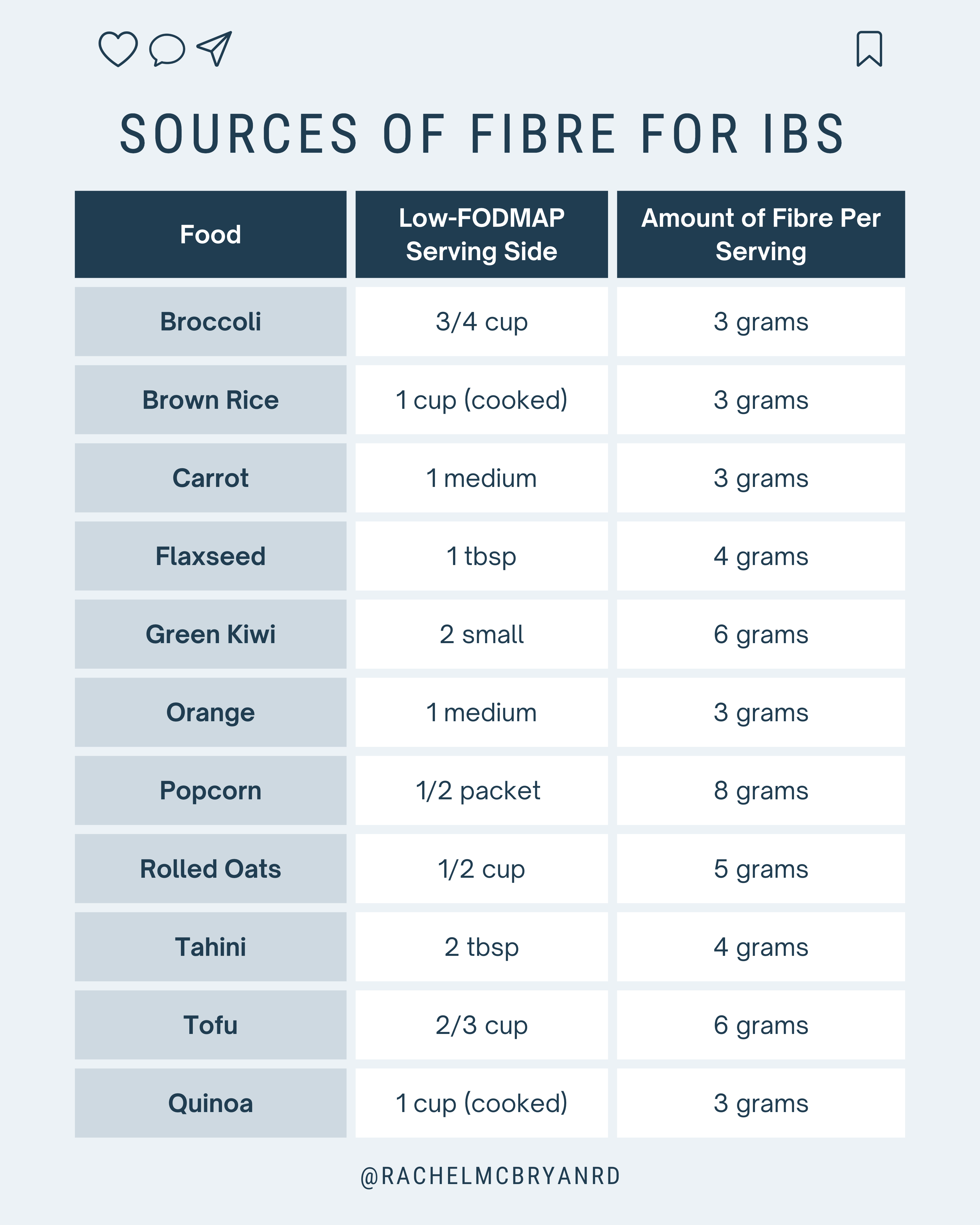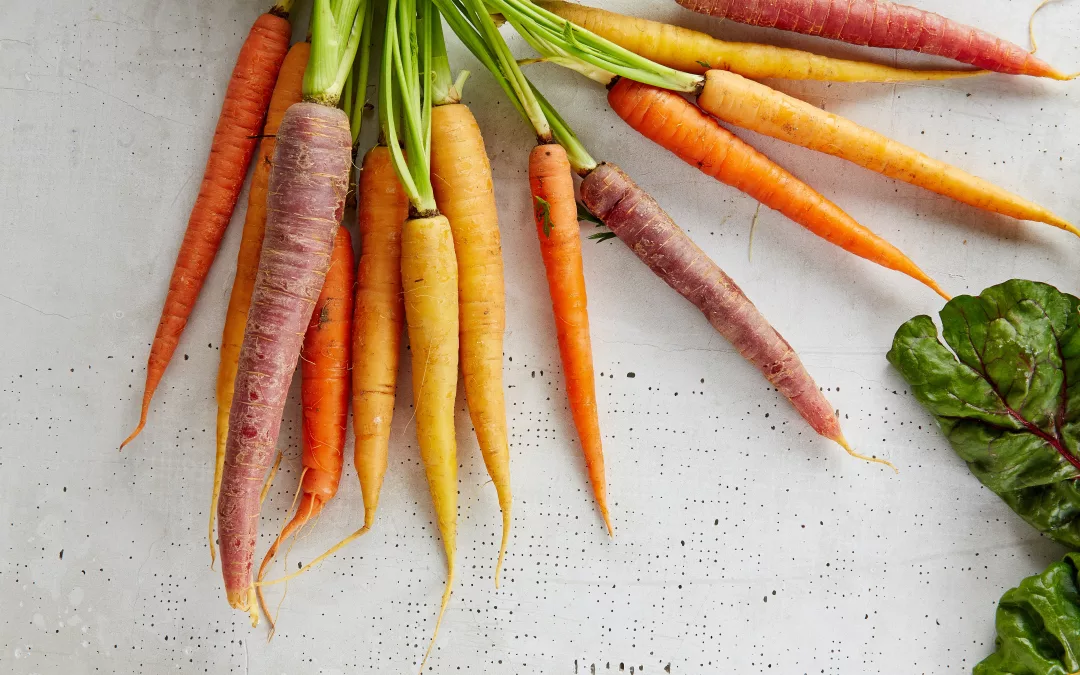Written by Kimberley Gittens, RD on behalf of Rachel McBryan, RD
Fibre is an essential part of a health diet, but getting enough fibre in your IBS-friendly diet can be difficult. Despite the challenges of including fibre in a low-FODMAP diet, there are many ways to ensure you’re meeting your fibre requirements with an IBS-friendly diet.
What is Fibre?
Fibre is a type of complex carbohydrate found in plant-based foods. You may often hear it referred to as “roughage” or “bulk”. Fibre is an important part of a nutritious diet and has many health benefits, including supporting a healthy gut.
In terms of your gut health, fibre is partially responsible for keeping your bowel movements regular, and supporting the growth of beneficial bacteria in your gut.
Fibre in a Low-FODMAP Diet
As a complex carbohydrate, fibre is often found in foods that are also high in FODMAPs. This means that if you’re following a low-FODMAP diet by restricting your intake of high-FODMAP foods, you will likely also be restricting your intake of fibre.
Not getting adequate amounts of fibre in your diet can negatively impact aspects of your health. Studies show that inadequate fibre intake is associated with,
-
- Constipation
- Hemorrhoids
- Diverticulitis
- Bowel cancer
- Higher cholesterol
Additionally, a low-fibre diet is also associated with an increased risk of heart disease and diabetes. The restrictive nature of the low-FODMAP diet is one of many reasons the diet should not be used as a long-term diet, but rather as a stepping stone for identifying your personal IBS triggers.
Sources of Fibre for IBS
It is possible to follow a low-FODMAP diet, and include adequate amounts of fibre in your diet. In the table below you can find some low-FODMAP foods to include in your diet to boost your fibre intake.

Supplemental Fibre for IBS
Fibre supplements are available on most pharmacy shelves and can be used to help boost your fibre intake. Some studies suggest that supplementation can not only ensure you meet your fibre requirements, but also reduce GI symptoms of IBS.
However, there are many different types of fibre supplements and some may be more effective in reducing IBS symptoms than others.
Some types of fibre are more fermentable than others. The more fermentable a fibre is, the more gas it can produce while in your gut. With IBS, you may want to avoid supplements with more fermentable fibres as the large amount of gas produced can aggravate your IBS symptoms. This includes supplements that contain wheat bran, fructo-oligosaccharides (FOS) and galacto-oligosaccharides (GOS).
The table below highlights the types of fibre to include in your IBS-friendly diet.
Supplements containing less-fermentable fibres may be more easily tolerated in your diet due to less gas production. These include,
-
- Psyllium
- Linseeds
- Oats
- Streculia
- Methylcellulose
With IBS, you may want to avoid easily fermented fibres due to the gas production. This includes,
-
- Wheat bran
- Inulin
- FOS and GOS
Supplements for IBS-C
IBS-C is one of four different types of IBS. It is distinguished from the other types of IBS by constipation as the dominant symptom. Early studies suggest that supplementation with sterculia, methylcellulose, or partially hydrolysed guar gum (PHGG), can particularly beneficial in IBS-C due to low-fermentability and stool-softening properties of the fibres.
Get Help Identifying Your IBS-Triggers
Identifying your IBS triggers allows you to eliminate them from your diet, and prevent flares up and post-meal discomfort. Book a FREE discovery call today to learn more about working with a Registered Dietitian to manage your IBS!
References
Dietary Fibre. (n.d.). Better Health. https://doi.org/10.3390/NU10091223
El-Salhy, M., Ystad, S. O., Mazzawi, T., & Gundersen, D. (2017). Dietary fiber in irritable bowel syndrome (Review). International Journal of Molecular Medicine, 40(3), 607. https://doi.org/10.3892/IJMM.2017.3072
Iacovou, M., & McNamara, L. (2017, November 10). Fibre supplements & IBS. Monash University FODMAP Blog. https://www.monashfodmap.com/blog/fibre-supplements-ibs/
Varney, J. (2021, January 14). Getting enough fibre. Monash University FODMAP Blog. https://www.monashfodmap.com/blog/getting-enough-fibre/
Kimberley is a Registered Dietitian, licensed in Ontario. She helps clients across Ontario control their blood sugars and reduce their risk of chronic conditions.


